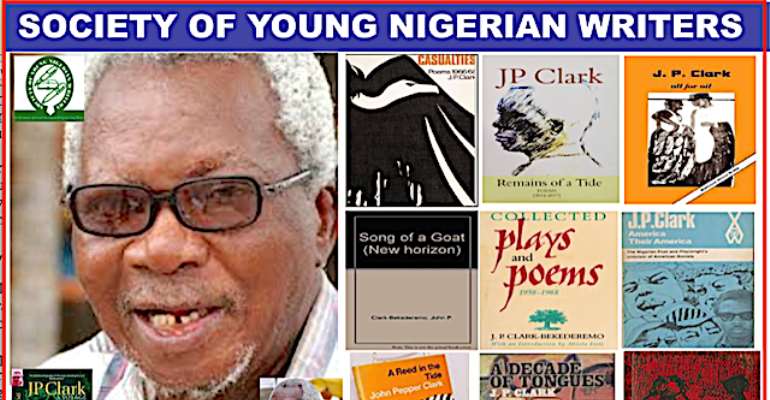Synw Mourns Prof. J.p Clark, Set To Promote His Life And Worksthrough J.p. Clark Literary Society

The Society of Young Nigerian Writers (SYNW) has expressed sadness over the death of Nigeria’s Literary Icon, Prof. J.P Clark. The body also commiserated with the Government and people of Delta State over the passing of the renowned poet, literary scholar and playwright.
In a press statement issued and signed by the national president of SYNW, Wole Adedoyin described the death of the renowned poet and playwright, Prof. J.P Clark, as a great loss to the literary community and Nigeria.
SYNW described the contributions of the late Literary Icon to the creative industry of the country as Legendary.
It would be recalled that SYNW in 2015 launched and inaugurated J.P Clark Literary Society at the J.P Clark Centre, University of Lagos with the late Poet in attendance. The idea behind the formation of the group is to promote the works, legacy and literary ideology of the late Poet.
The umbrella body of young writers in Nigeria further urged members of Prof. J.P Clark’s family, his fellow authors and all who mourn him to take solace in the knowledge that the much admired writer’s beliefs, views and insights will live forever through the body of works he has left behind for present and future generations.
SYNW finally urged Dr. Ifeanyi Arthur Okowa of Delta State to immortalize Prof. J.P Clark’s name and prayed that Almighty God will receive Prof. J.P Clark’s soul and grant him eternal rest.
John Pepper Clark, pseudonym J.P. Clark-Bekederemo, (born April 6, 1935, Kiagbodo, Nigeria), the most lyrical of the Nigerian poets, whose poetry celebrates the physical landscape of Africa. He was also a journalist, playwright, and scholar-critic who conducted research into traditional Ijo myths and legendsand wrote essays on African poetry.
While at the University of Ibadan, Clark founded The Horn, a magazineof student poetry. After graduating with a degree in English in 1960, he began his career as writer and journalist by working as a Nigerian government information officer and then as the features and editorial writer for the Daily Express in Lagos (1960–62). A year’s study at PrincetonUniversity on a foundation grant resulted in his America, Their America (1964), in which he attacks American middle-class values, from capitalism to blackAmerican life-styles. After a year’s research at Ibadan’s Institute of African Studies, he became a lecturer in English at the University of Lagos and coeditor of the literary journal Black Orpheus.
Clark’s verse collections Poems (1962) and A Reed in the Tide (1965) do not display the degree of craftsmanship apparent in the work of his fellow Nigerian Christopher Okigbo; but in his best poems his sensual imagination makes successful use of the patterns of traditional African life. His Casualties: Poems 1966–68 (1970) is concerned primarily with the Nigerian civil war. Other poetry collections include A Decade of Tongues(1981), State of the Union(1985, as J.P. Clark Bekederemo), and Mandela and Other Poems (1988).
Of his plays, the first three (published together under the title Three Playsin 1964) are tragedies in which individuals are unable to escape the doom brought about by an inexorable law of nature or society. Song of a Goat (performed 1961), a family tragedy, was well received throughout Africa and Europe for its dramatic skill and the poetic quality of its language. The Masquerade (performed 1965) again portrays a family tragedy, but it is The Raft (performed 1978) that is considered to be his finest piece of dramatic writing. The situation of four men helplessly adrift on a raft in the Niger River suggests both the human predicament and the dilemma of Nigeria in the modern world. Clark’s characterization is convincing and his symbolic setting richly allusive.
A more experimental work, Ozidi (performed in the early 1960s; pub. 1966), is a stage version of a traditional Ijo ritual play, which in a native village would take seven days to perform. Like Yoruba folk opera, it is alive with music, dancing, mime, and spectacle. Clark also produced a film (with Francis Speed; The Ozidi of Atazi [1972]) and an English translation of this Ijaw epic.
